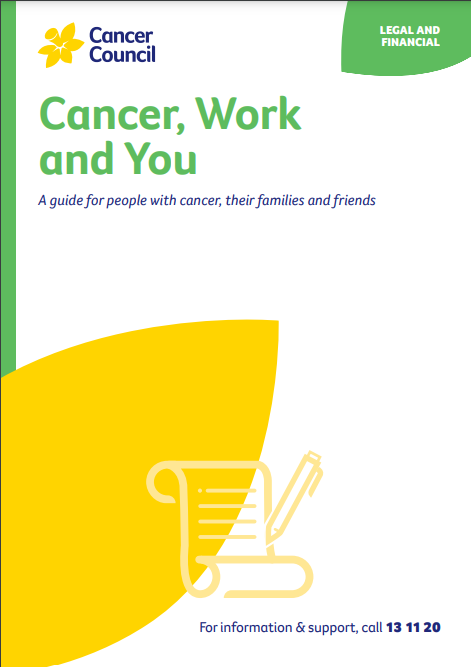Working
It can be hard to predict how well you will recover from treatment for a brain tumour, and if or when you will be able to return to work. This may also depend on the type of work you do.
Some people find it hard to concentrate or make decisions after they have treatment for a brain tumour. At least at first, it may not be safe to operate heavy machinery or take on a lot of responsibility. Your doctors and an occupational therapist can tell you whether it’s okay to return to work.
Talk to your employer about adjusting your duties or hours until you have recovered. In some cases, it won’t be possible to return to your former role. It may help to talk to a social worker, occupational therapist or psychologist, call Cancer Council 13 11 20 or join a brain tumour support group to try and come to terms with these changes.
Learn more about cancer, work and you.
I was diagnosed with a grade 4 glioblastoma that couldn’t be operated on, so I had radiation therapy and chemotherapy. I needed to stop work and I couldn’t drive. I found it all mentally draining.
John
→ READ MORE: Life after treatment for brain cancer
More resources
Prof Lindy Jeffree, Director of Neurosurgery, Alfred Health, VIC; Caitriona Nienaber, 13 11 20 Consultant, Cancer Council WA; Prof Tamara Ownsworth, Clinical Neuropsychologist and Research Director, The Hopkins Centre, Griffith University, QLD; A/Prof Hao-Wen Sim, Medical Oncologist, The Kinghorn Cancer Centre and Chris O’Brien Lifehouse, NSW; Megan Trevethan, Clinical Specialist Occupational Therapy – Cancer and Lymphoedema Services, Princess Alexandra Hospital, QLD; Chris Twyford, Cancer Specialist Nurse, Canberra Health Services, Cancer and Ambulatory Support, ACT; Dr Adam Wells, Clinical Academic Consultant Neurosurgeon, The University of Adelaide, Royal Adelaide Hospital, SA.
View the Cancer Council NSW editorial policy.
View all publications or call 13 11 20 for free printed copies.

